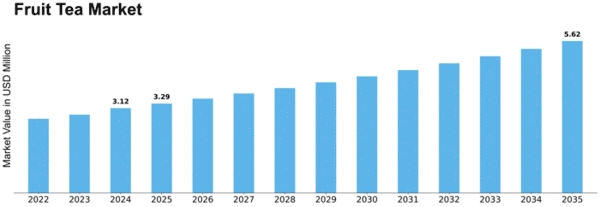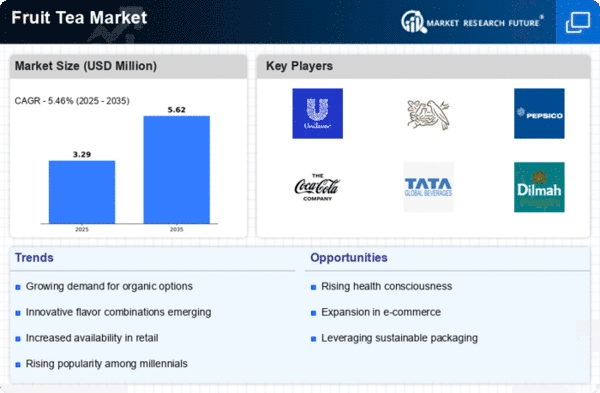Fruit Tea Size
Fruit Tea Market Growth Projections and Opportunities
The Fruit Tea Market is influenced by a diverse array of factors that collectively define its growth trajectory and market dynamics. One of the primary drivers behind the expansion of this market is the increasing consumer inclination towards healthier beverage options. As individuals become more health-conscious, there is a growing demand for beverages that offer both refreshment and nutritional benefits. Fruit tea, often infused with a variety of fruits and herbs, has gained popularity as a flavorful and healthful alternative to traditional sugary drinks, contributing to the overall growth of the fruit tea market. The Fruit Tea Market is poised for substantial growth, with projections indicating a noteworthy expansion to surpass USD 2.34 billion by the year 2030. This anticipated growth is set to occur at a robust Compound Annual Growth Rate (CAGR) of 8.10% throughout the forecast period spanning from 2020 to 2030. The positive outlook of the fruit tea market is underpinned by various factors contributing to its sustained and accelerated growth.
The forecasted CAGR of 8.10% underscores the market's resilience and dynamic nature, propelled by increasing consumer awareness of the health benefits associated with fruit-infused teas. As consumers seek healthier beverage alternatives, the demand for fruit tea rises, fostering market expansion. The projected market value exceeding USD 2.34 billion by 2030 signifies significant economic impact and solidifies fruit tea's position as a prominent player in the global beverage market.
As the market continues to evolve, stakeholders are presented with opportunities for innovation, product diversification, and strategic investments to capitalize on the growing popularity of fruit tea. The forecasted growth highlights the sector's potential to meet evolving consumer preferences and contribute substantially to the ever-expanding landscape of the beverage industry. Moreover, the trend towards natural and organic products is playing a significant role in shaping the fruit tea market. Consumers are seeking beverages that are free from artificial additives and preservatives, and fruit teas, with their natural fruit extracts and herbal ingredients, align well with this preference. The emphasis on clean labeling and transparency in ingredient sourcing has become a key factor influencing purchasing decisions, driving the demand for fruit teas that are perceived as wholesome and authentic.
The variety and innovation in flavor profiles are another crucial factor contributing to the growth of the fruit tea market. Manufacturers are continually introducing new and exotic fruit combinations, enticing consumers with unique taste experiences. The versatility of fruit teas, which can be enjoyed hot or cold, further adds to their appeal. This diversity in flavor options caters to a broad consumer base, capturing the interest of those seeking novel taste sensations and expanding the overall market reach.
Furthermore, the global movement towards sustainability and eco-friendly practices is impacting the fruit tea market. Consumers are increasingly conscious of the environmental impact of their choices and are gravitating towards brands that prioritize sustainability in their production processes and packaging. Companies in the fruit tea market are responding by adopting eco-friendly packaging solutions and sourcing ingredients through sustainable and ethical practices, contributing to a more environmentally responsible industry.
The influence of cultural and regional preferences also plays a crucial role in shaping the fruit tea market. Different regions have unique taste preferences and traditional tea-drinking habits, influencing the types of fruit teas that are popular in specific markets. For example, hibiscus-infused fruit teas might be more popular in certain tropical regions, while berry-infused teas could be favored in others. Understanding and catering to these cultural nuances are essential for market players seeking to establish a strong presence and meet the diverse demands of consumers globally.
Despite the positive trends, challenges such as market saturation and competition from other beverage categories pose hurdles for the fruit tea market. The crowded beverage market, which includes various types of teas, juices, and functional drinks, requires fruit tea brands to differentiate themselves effectively. Successful marketing strategies, unique flavor offerings, and strategic collaborations can help overcome these challenges and carve out a distinct market position.



















Leave a Comment